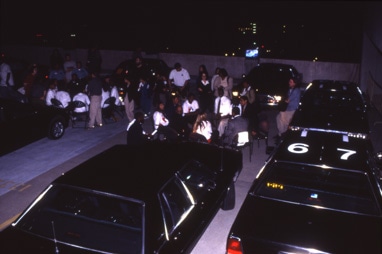The Spin – Myth or Reality?
On May 1, 2003, after a dramatic photo-op fighter-jet landing on the aircraft carrier the USS Abraham Lincoln, standing before a huge banner hung on the ship that read “Mission Accomplished,” Bush declared the war’s major combat operations to be over. 1 On July 16, however, a little less than three months later, as organized attacks on occupation forces were on the rise, the new commander of U.S. Central Command, General John Azibaid, acknowledged that the U.S. occupying forces in Iraq were facing a “classical guerrilla-type campaign.” 2 No weapons of mass destruction have as yet been found in the occupied country, and the administration’s arguments for war have been rapidly losing currency – a currency that many believe they never should have had in the first place.
The Bush administration was helped tremendously in advancing its war agenda domestically by the U.S. media. Embracing the administration’s arguments for its post-September 11 policies, both at home and abroad, media outlets gave virtually no room for dissent or even objective discussion – particularly in the lead-up to the Iraq invasion and during the war itself, when U.S. reporters were “embedded” with advancing U.S. troops. The “embedding” of media was only the most overt aspect of the administration’s policy of misinformation and propaganda to achieve its goals vis-à-vis Iraq.
Almost as soon as Bush began his rhetorical assault on the imminent threat of Hussein’s weapons of mass destruction, it would be revealed time and again that evidence he cited was false, nonexistent, or distorted. One of the first examples was his statement in October 2002 that an IAEA report on Hussein’s nuclear capacity alleged that the regime was “six months away” from developing a nuclear weapon. Almost immediately the IAEA refuted the allegation, pointedly noting that no such report existed. While Bush’s claims were disseminated loudly and clearly, the subsequent disclaimer by his spokesperson Ari Fleisher was barely noted by the media. It still remains a piece of misinformation little touched on by the media. 3
Other evidence of weapons of mass destruction, cited by Bush and high-ranking members of his administration, has also proven to be either completely false or to have been made “more forward-leaning” in order to bolster the position that the administration wanted to prove. 4 The most notorious example of the use of false information is Bush’s statement in his State of the Union Address (January 28, 2003) that Hussein sought uranium for nuclear weapons in Africa. 5 The CIA had successfully argued for removal of a similar statement from an earlier speech Bush gave in October 2002 because it knew the “evidence” was not credible. It also has stated that it pressed the White House to drop such allegations from Bush’s address. 6
An example of the Bush administration making information “more forward-leaning” was the explanation it offered for the case of aluminum tubes bought by Iraq. The administration declared these would be used for producing nuclear bombs. Although numerous experts stated that the tubes were not for nuclear production, administration officials presented the issue as yet more proof of its case for war. One intelligence analyst who had participated in the aluminum-tubes debate said, “You had senior American officials like Condoleezza Rice saying the only use of the aluminum really is uranium centrifuges. She said that on television. And that’s just a lie.” 7
It has been widely reported that Vice President Dick Cheney, his chief-of-staff, Lewis “Scooter” Libby, and others repeatedly visited CIA headquarters to press for interpretations of information to support the push for war. 8 One senior administration official said, “Nearly every day, Cheney and Scooter hammered the agency on Iraq or terrorism. Over time, the agency got tired of fighting.” 9 But apparently, even this pressure did not satisfy the needs of the administration. Defense Secretary Donald Rumsfeld set up a shadow agency, the Office of Special Plans (OSP), to compete with the CIA and its military counterpart, the Defense Intelligence Agency, in interpretation of data. 10
The other primary argument for the invasion was the “bulletproof” evidence, as declared in September 2002 by Donald Rumsfeld, that Saddam Hussein had ties with al Qaeda. 11 President Bush and his advisors repeatedly talked of these ties, with the barely veiled implication that, because of the links, Hussein was in some way responsible for the attacks of September 11, 2001. Yet, these claims proved even weaker, if that is possible, than the evidence provided regarding the weapons of mass destruction in Hussein’s possession.
On June 15, 2003, retired General Wesley Clark was interviewed on NBC television’s Meet the Press, during which he stated that the Bush administration began trying to implicate Hussein immediately after the September attacks. Clark said,
Well, it came from the White House, it came from people around the White House. It came from all over. I got a call on 9/11. I was on CNN, and I got a call at my home saying, “You got to say this is connected. This is state-sponsored terrorism. This has to be connected to Saddam Hussein.” I said, “But – I’m willing to say it, but what’s your evidence?” And I never got any evidence. 12
According to the nonprofit media watchdog group, Fairness and Accuracy in Reporting,
Clark’s assertion corroborates a little-noted CBS Evening News story that aired on September 4, 2002. As correspondent David Martin reported: “Barely five hours after American Airlines Flight 77 plowed into the Pentagon, the secretary of defense was telling his aides to start thinking about striking Iraq, even though there was no evidence linking Saddam Hussein to the attacks.” According to CBS, a Pentagon aide’s notes from that day quote Rumsfeld asking for the “best info fast” to “judge whether good enough to hit SH at the same time, not only UBL.” (The initials SH and UBL stand for Saddam Hussein and Osama bin Laden.) The notes then quote Rumsfeld as demanding, ominously, that the administration’s response “go massive . . . sweep it all up, things related and not.” 13
Others in and around the Bush administration began publicly trying to connect Hussein to al Qaeda and thus to the attacks of September 11, 2001. On behalf of the administration, James Woolsey, a former director of the CIA and a current member of the Defense Policy Board, went to Europe to seek evidence to back the claim. His evidence – that Mohamed Atta, the leader of the September 11 attacks, had met with an Iraqi intelligence official in Prague – was not supported by U.S. intelligence or by Czech officials. 14 In February 2003, the New York Times reported that an FBI official said, “We’ve been looking at this hard for more than a year and you know what, we just don’t think it’s there.” 15 Additionally, a classified British intelligence report seen by BBC News stated, “There are no current links between the Iraqi regime and the al-Qaeda network.” 16
- Associated Press, “Bush to Declare Major Combat Over in Iraq,” April 30, 2003.[↑]
- Jonathan Marcus, “U.S. Faces Up to Guerrilla War: It Has Taken a Change in Command for Senior U.S. Officers to Utter the ‘G’ Word about Iraq,” News, BBC, July 17, 2003, http://news.bbc.co.uk/1/hi/world/middle_east/3074465.stm; and Vernon Loeb, “‘Guerrilla’ War Acknowledged: New Commander Cites Problems,” Washington Post, July 17, 2003, sec. A.[↑]
- Dana Milbank, “For Bush, Facts Are Malleable,” Washington Post, October 22, 2003; Fairness and Accuracy in Reporting (FAIR), “Media Advisory: Bush Uranium Lie Is Tip of the Iceberg: Press Should Expand Focus Beyond ’16 Words,'” July 18, 2003. For an analysis of 16 major distortions by the administration to justify the invasion of Iraq, see Council for a Livable World, “Iraq: 16 Distortions, not 16 Words,” July 31, 2003, http://www.clw.org/16distortions.html.[↑]
- John W. Dean, “Missing Weapons of Mass Destruction: Is Lying about the Reason for War an Impeachable Offense?” FindLaw, June 6, 2003; and James Risen and Douglas Jehl, “Expert Said to Tell Legislators He Was Pressed to Distort Some Evidence,” New York Times, June 25, 2003.[↑]
- Articles and analyses of the evidence presented by the Bush administration to justify attacking Iraq abound. See, for example, William M. Arkin, “A Hazy Target; Before Going to War Over Weapons of Mass Destruction, Shouldn’t We Be Sure Iraq Has Them?” Los Angeles Times, March 9, 2003; Seymour M. Hersh, “Offense And Defense,” New Yorker, April 7, 2003; Robin Cook, “Shoulder to Shoulder and Stabbed in the Back,” Los Angeles Times, June 6, 2003; Dean, “Missing Weapons of Mass Destruction”; John B. Judis and Spencer Ackerman, “The Selling of the Iraq War: The First Casualty,” New Republic, June 30, 2003; Dana Milbank, “White House Didn’t Gain CIA Nod for Claim on Iraqi Strikes: Gist Was Hussein Could Launch in 45 Minutes,” Washington Post, July 20, 2003; and Dana Priest, “Uranium Claim Was Known for Months to be Weak: Intelligence Officials Say ‘Everyone Knew’ Then What the White House Knows Now About Niger Reference,” Washington Post, July 20, 2003.[↑]
- Edward T. Pound and Bruce B. Auster, “The Plot Thickens: New Evidence Fails to Resolve Mystery of Bush’s State of the Union Misstep on Iraq,” U.S. News and World Report, July 28 to August 4, 2003. See also Robert Sheer, “A Diplomat’s Undiplomatic Truth: They Lied,” Los Angeles Times, July 8, 2003.[↑]
- Judis and Ackerman, “The Selling of the Iraq War.”[↑]
- Judis and Ackerman, “The Selling of the Iraq War”; Julian Berger, “The Spies Who Pushed for War,” Guardian, July 17, 2003; Jim Lobe, “The Other Bush Lie,” TomPaine.com, July 15, 2003; and Ray McGovern, “Not Business as Usual: Cheney and the CIA,” Alternet, June 30, 2003. In “Not Business as Usual,” McGovern writes, “As though this were normal! I mean the repeated visits Vice President Dick Cheney made to the CIA before the war in Iraq. The visits were, in fact, unprecedented. During my 27-year career at the Central Intelligence Agency, no vice president ever came to us for a working visit.”[↑]
- Pound and Auster, “The Plot Thickens.”[↑]
- Berger, “The Spies Who Pushed for War.”[↑]
- Judis and Ackerman, “The Selling of the Iraq War.”[↑]
- FAIR, “Media Advisory: Media Silent on Clark’s 9/11 Comments: General Says White House Pushed Saddam Link without Evidence,” June 20, 2003.[↑]
- FAIR, “Media Advisory: Media Silent.”[↑]
- Judis and Ackerman, “The Selling of the Iraq War.”[↑]
- James Risen and David Johnston, “Split at C.I.A. and F.B.I. on Iraqi Ties to Al Qaeda,” New York Times, February 2, 2003.[↑]
- BBC, “Leaked Report Rejects Iraqi Al-Qaeda Link,” News, February 5, 2003, http://news.bbc.co.uk/1/hi/uk/2727471.stm.[↑]



